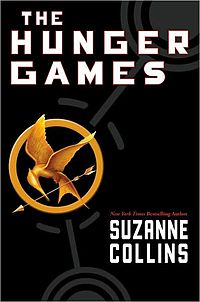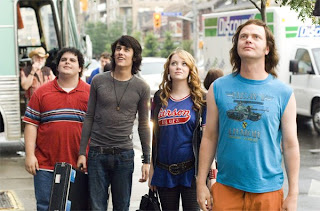HOW NOT TO WRITE SCIENCE FICTION OR ANYTHING ELSE THAT'S GOOD
by Deborah Jackson:
My books, although laden with adventure, always explore complex issues, deep moral themes and are sprinkled with facts, scientific jargon and hopefully fresh material for kids and adults to learn and grow (as I did, when I researched them). Every learning opportunity for me is another for my readers.
Why would I ignore trends, the voices of experience? Have you ever re-read a book that was superficial, empty, and reiterated old and dreary facts? Have you ever recommended a book that didn’t touch you in some way? You might have said to a friend: “It’s okay. It’s a light read.” You might have even thrust it into their hands so you wouldn’t have to get rid of it yourself. A light read might make it up to the bestseller list—we know who you are—but it won’t be talked about for years to come (unless it’s mocked and scorned). Dracula, however, will never go away. There’s nothing sparkly about real evil.
 The Hunger Games fled my shelf recently, (because my daughter lent it to a friend,
who lent it to a friend, etc.) and I had to re-purchase it for my class,
because it’s an example of a book that doesn’t shy away from complex issues:
communism/fascism and the importance of that one defiant voice (such as Martin
Luther King or Nelson Mandela). A student told me how a friend borrowed The Book Thief from the library, and then someone stole it. ;) No doubt this happened because it’s
such a good read: Nazi Germany, death—are those light themes?
The Hunger Games fled my shelf recently, (because my daughter lent it to a friend,
who lent it to a friend, etc.) and I had to re-purchase it for my class,
because it’s an example of a book that doesn’t shy away from complex issues:
communism/fascism and the importance of that one defiant voice (such as Martin
Luther King or Nelson Mandela). A student told me how a friend borrowed The Book Thief from the library, and then someone stole it. ;) No doubt this happened because it’s
such a good read: Nazi Germany, death—are those light themes?
In recent years, I’ve heard this phrase
commonly used by editors and agents: “nothing didactic.” Or this one, “eliminate
the deep moral themes.” Ruled by my defiant nature, (a quality my son shares,
although it exhibits itself in his refusal to read, an issue that gives me
constant pain) I ignored them.
My books, although laden with adventure, always explore complex issues, deep moral themes and are sprinkled with facts, scientific jargon and hopefully fresh material for kids and adults to learn and grow (as I did, when I researched them). Every learning opportunity for me is another for my readers.
Why would I ignore trends, the voices of experience? Have you ever re-read a book that was superficial, empty, and reiterated old and dreary facts? Have you ever recommended a book that didn’t touch you in some way? You might have said to a friend: “It’s okay. It’s a light read.” You might have even thrust it into their hands so you wouldn’t have to get rid of it yourself. A light read might make it up to the bestseller list—we know who you are—but it won’t be talked about for years to come (unless it’s mocked and scorned). Dracula, however, will never go away. There’s nothing sparkly about real evil.
 The Hunger Games fled my shelf recently, (because my daughter lent it to a friend,
who lent it to a friend, etc.) and I had to re-purchase it for my class,
because it’s an example of a book that doesn’t shy away from complex issues:
communism/fascism and the importance of that one defiant voice (such as Martin
Luther King or Nelson Mandela). A student told me how a friend borrowed The Book Thief from the library, and then someone stole it. ;) No doubt this happened because it’s
such a good read: Nazi Germany, death—are those light themes?
The Hunger Games fled my shelf recently, (because my daughter lent it to a friend,
who lent it to a friend, etc.) and I had to re-purchase it for my class,
because it’s an example of a book that doesn’t shy away from complex issues:
communism/fascism and the importance of that one defiant voice (such as Martin
Luther King or Nelson Mandela). A student told me how a friend borrowed The Book Thief from the library, and then someone stole it. ;) No doubt this happened because it’s
such a good read: Nazi Germany, death—are those light themes?
Books rich with details of history or
science, Wilbur Smith’s Egyptian series or Cryptonomicon, are examples of those that I will not part with (unless someone lends them to a friend, who then lends them to a friend, etc.)
I do write fast-paced, action-packed
thrillers. But I still want the book to linger in your mind long after you’ve
read it. I want you to say, “Wow, I didn’t know that the Piri Reis map, copied
and recopied over hundreds of years, and originating long before modern
ground-penetrating radar and satellite images, displayed all the contours of
Antarctica without the ice sheet.” Or something along those lines, but not
quite so longwinded. Or you might say, “Cool,” regarding nanobots that could
replace heart surgeons.
Maybe the description of a cave in my upcoming book Sinkhole will inspire you to visit caves, even those slick with “bloody” bat
urine from vampire bats. Or maybe not. But if they will make you ponder the
desperation of people caught in the trap of poverty, or the shades of grey to
every human being, even apparently evil ones, or the injustice of the past that
filters into the present, then I have done my job. Because I refuse to write an
empty book. (If you haven’t noticed, generally Book 2 of most trilogies is
simply “filler.”) And even if you’re picking up a book to escape the real
world, I hope it will still touch you on the journey.
BIO:
Deborah Jackson received a
science degree from the University of Ottawa in 1986, graduated from The
Writing School in Ottawa in 2001, and is the author of several critically
acclaimed science fiction and historical fiction novels. She gives school
presentations in Ontario and Skype presentations throughout the world as well
as developing and teaching writing courses at the Shenkman Arts Centre. Deborah
is a member of the Society of Children's Book Writers and Illustrators and Speculative Fiction Canada. Her novels include: Ice Tomb, an adult science fiction
thriller, and the Time Meddlers series for children, ages 9 – 12: Time Meddlers, Time Meddlers Undercover, and upcoming release Time Meddlers on the Nile . Articles about Deborah and reviews of her books have appeared in The
Ottawa Citizen, The
Ottawa Sun, MORE
Magazine, The
RT Bookclub Magazine, The Albuquerque Alibi, Canadian Teacher Magazine, SF Site, Neo-opsis Science Fiction Magazine and many more.



Amen to all you say, and brava for standing up for substance over superficial style. I once read Norman Spinrad discussing PKD and he said, "He does serious work in popular form; there is no higher praise." That stuck with me. We read works by writers long gone because their stories address human situations that never go away or get old. Thank you for a great blog.
ReplyDeletewell color me SOLD! I'm dying to read some of your work now :) *runs to her goodreads to-read shelf*
ReplyDeleteYou're welcome and thanks. I suppose I'm getting tired of most of the YA I've seen lately, and what's being promoted. Always interested in deeper themes and actual content, as I imagine you are.
ReplyDelete